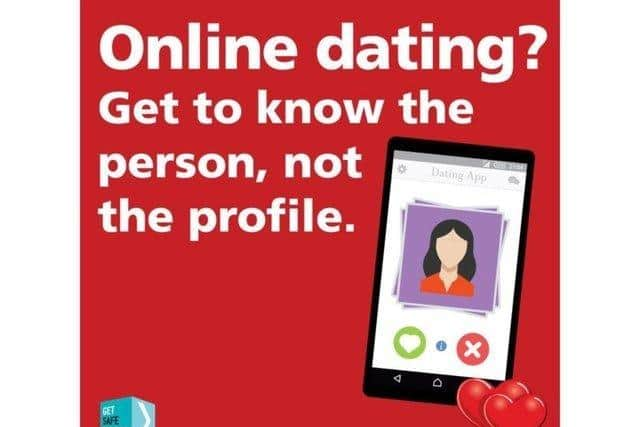Victim of dating site ‘romance scam’ speaks out


Susan (we’ve changed her name) can’t tell if the sun is shining.
It’s just after one-thirty in the afternoon but the curtains of her lounge window are drawn.
It’s market day but she doesn’t feel like going out.


Advertisement
Hide AdAdvertisement
Hide AdA bowl of tomato soup has long since gone cold. The bread roll is untouched.
Her phone rings. She doesn’t answer it.
Her immaculately kept terraced house is no different to any other in the street.
You can hear the excited chatter of children on their way back to school.
Susan appears to be staring at a framed photograph of her husband on the mantelpiece.
He died four years ago - at the age of 51.
Advertisement
Hide AdAdvertisement
Hide AdThey were childhood sweet-hearts having met at a dance when they were 14. They married when Susan was 22.
“It (getting married) was the happiest day of my life,” she says, slipping a handkerchief between her fingers.
“We rarely had a cross word. We never went to bed on an argument. I still miss him, every single day.”
Susan admits it took a long time to get over his passing. Slowly but surely, she re-built her life.
Advertisement
Hide AdAdvertisement
Hide AdStill in her mid-40s, friends encouraged Susan to start socialising again.
There was a ‘girls only’ holiday to Spain, days out to stately homes at the coast.
Encouraged by those same friends, Susan also ‘signed up’ to a dating app.
She adds: “I’d read all the warnings... don’t give details away, your address...get to know a person before you give out any contact details….this tea has gone cold…”
Her voice drifts off.
Advertisement
Hide AdAdvertisement
Hide AdShe recalls that after several ‘contacts, she met Vikram (again the name has been changed).
“He said he was a dentist,.” says Susan, “in the Midlands.”
Susan checked online and confirmed the name of the business existed.
She didn’t delve further for any details - like the actually names of staff members.
“He was happy to talk about his job,” says Susan.
“He explained his first wife had died, from cancer. I could relate to a lot he was saying.
“He had friends but he was lonely. Not desperate...lonely.”
At first, they chatted by phone.
Advertisement
Hide AdAdvertisement
Hide AdVikram always rang Susan - from a mobile. The number never registered.
At his suggestion, they didn’t use Facebook but an app for a what appears to have been an ‘unregistered’ site.
Susan explains: “He said Facebook wasn’t secure and people could read your conversations.
“He said this other site was safe.”
Susan shakes her head as adds: “At first, we talked about jobs and hobbies...things like that.
“As we got to know each other, I did, well, open up more.
Advertisement
Hide AdAdvertisement
Hide Ad“He talked about his job, his life. I believed him. I never had reason not to really.
“There was no pressure from him...he seemed genuine.”
If there were warning signs, Susan admits she never saw them, or perhaps didn’t want to.
She didn’t talk to her friends about Vikram.
“It’s strange,” she says. “Most of them knew my husband and I thought I’d be betraying him.”
After almost four months, Susan and Vikram, arranged to meet... in an East Midlands city.
Advertisement
Hide AdAdvertisement
Hide AdSusan booked a return train ticket, bought a new outfit and, the day before, spent two hours in a hair salon.
A smile lights her face as she recalls: “I had my nails done as well.”
Susan had seen photos of Vikram.
She explains: “He was always dressed smartly. In two or three photos, there were children. He said they were his nieces and nephews….”
Again, her voice tails off to some other place.
The day before they agreed meet, Vikram rang to cancel the appointment.
Advertisement
Hide AdAdvertisement
Hide Ad“He was in a real panic,” says Susan. “He said his mother was desperately ill and he had to return to India straight away.
“He was taking his teenage niece and nephew with him.”
He told Susan that because all his money was ‘tied up’ in an office refurbishment, he didn’t have time to contact his bank.
Susan explains: “He explained he wanted to fly out the next day.
“He’d checked. There were seats available but he needed £12,000.
“We’d already talked about the work at the business.
Advertisement
Hide AdAdvertisement
Hide Ad“He seemed really upset. He sounded to be in tears. When I offered to help, he even said: ‘No, I cannot take your money.’
“I persisted...I know, I was stupid, naive. I just wanted to help him.”
Susan arranged for funds to be transferred to an account at a bank in India.
She never heard from Vikram again.
When a friend checked the bank account, it had been closed down.
Advertisement
Hide AdAdvertisement
Hide AdWhen the friend asked, a staff member said she couldn’t reveal any details.
For some, £10,000 might not sound like a lot of money.
For Susan, it represented most of her last of her life-savings.
As she talks, Susan keeps saying: “I should have know, I should have know.
“How could I have been so stupid,” she adds, wiping a tear from her eye.
“I’d always been sensible. I never gave my details away. ”
Susan and her husband didn’t have children.
Advertisement
Hide AdAdvertisement
Hide AdShe still has friends but understandably finds it difficult to trust anyone.
She only agreed to speak out to warn others. Susan is by no means an isolated case.
In fact, she knows someone else who was scammed out of £40,000 in a fake romance. That is of no comfort.
Sally Gray, senior trading standards officer at Lincolnshire County Council, explains: “Online dating can be a great way to find romance and companionship.
Advertisement
Hide AdAdvertisement
Hide Ad“Unfortunately it’s also a very common way for scammers to target people, try and form relationships, and ultimately steal money from you.”
Shockingly, across the UK, victims of romance fraud lose an estimated £50 million each year.
Sally adds: “Unfortunately, the shame and humiliation victims of fraud feel means people often are afraid to get help and report their scammer.
“As such, we may never know the full extent of the problem.
“There are steps you can take to keep yourself, your family and friends safe from scammers online.”
Advertisement
Hide AdAdvertisement
Hide Ad•If you have you think you have been the victim of fraud, or you know it is happening to someone, contact the Police on 101 or report to Action Fraud on 0300 123 2040.
If somebody has been affected, Victim Lincs (01522 947510) can offer support/advice.